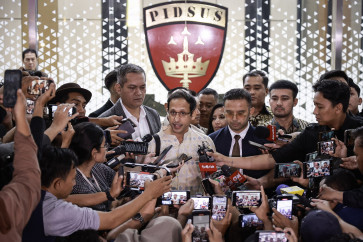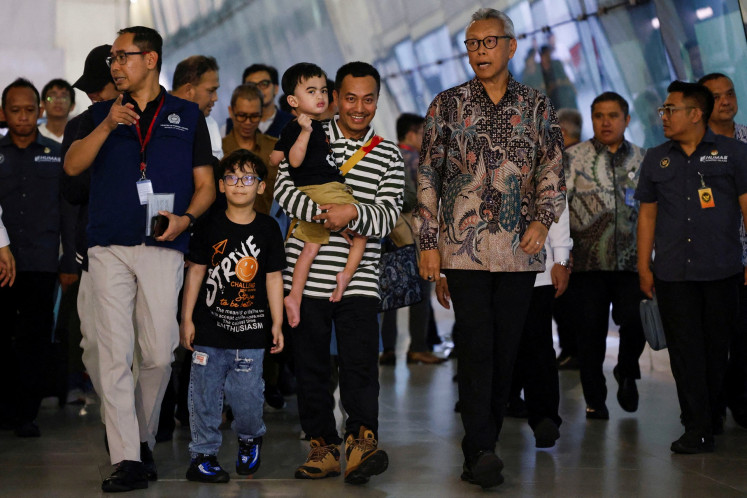Popular Reads
Top Results
Can't find what you're looking for?
View all search resultsPopular Reads
Top Results
Can't find what you're looking for?
View all search resultsEmmanuel Suharjendro: All things Javanese
JP/Simon SudarmanOn a Monday afternoon, 12 people gather in a traditional Javanese joglo mansion, making notes as they listen attentively to their instructor, even learning how to wear Javanese clothes
Change text size
Gift Premium Articles
to Anyone

JP/Simon Sudarman
On a Monday afternoon, 12 people gather in a traditional Javanese joglo mansion, making notes as they listen attentively to their instructor, even learning how to wear Javanese clothes.
"Everybody is required to speak Javanese throughout the session here," says Emmanuel Suharjendro, or Jendro, the 69-year-old founder, owner, instructor and leader of Bebana (Bebadan Basa Lan Kebudayaan) Nataharsana, an institute in Yogyakarta that provides training and lessons in various elements of Javanese culture.
By involving his children, relatives and friends, who share the same goal of preserving Javanese culture, through his institute, Jendro teaches trainees various skills such as sorah (Javanese speech), geguritan (poetry), Javanese calligraphy, etiquette, macapat (old verse recitation), story composition and the art of dressing in Javanese attire.
Joining the Javanese class are people from different social circles and educational backgrounds, frequently with a number of participants from various countries such as the US, the Netherlands, Britain, France and Japan.
"It's great to see the high enthusiasm among foreign trainees, in sharp contrast to their Javanese peers who actually inherit the ancestral culture," Jendro says, his tone colored with concern.
Although set up on Dec. 25, 1997, a year after his retirement, the institute has not made a great deal of progress. It has never had more than 30 students in a term. Jendro is very grateful for the 12 now doing the training. The small numbers have little to do with the fees; the problem is that only a few people - and even fewer youths - are interested in this effort to preserve the culture.
With more than 350 people finishing its training courses since its founding, Javanese culture is still not a lucrative field of business. Rather, the institute tends to incur losses so that a breakeven point is seen as a blessing. So Jendro warns that anyone interested in starting up a similar course needs to have financial stability to go with their knowledge of the subject.
"I'm already very satisfied with the principle that people having the same ideals gather here to share their knowledge with others," says Jendro, who has been actively writing about, observing and promoting Javanese culture since 1957.
"So don't expect any big profit. This institute continues to survive because of our love of Javanese culture. This spirit leads to the willingness to sacrifice our time, energy, thought and money."
Because of his love of Javanese culture, Jendro is frequently invited to give lectures in other areas, including in Klaten, Purwokerto, Semarang, Purworejo, Banyumas (Central Java) and Jakarta.
"Many people know about this Javanese culture training place, but what next? Courses on Javanese traditions promise no brighter future. Cultural preservation has to do more with satisfaction of the soul than enjoyment of material gain."
Consequently, the existence of the institute with its diverse lessons is far from being lauded. Despite the emergence of a lot of writers, poets and fluent speakers of Javanese from this institute, it has received no formal appreciation. The closest recognition is its collaboration with the Bantul education office in training Javanese language teachers to meet the obligation to include Javanese as a local subject in schools.
"Although many seek our assistance, to be frank, this institute is not yet registered. That's no problem as we don't have to pay tax either," Jendro says. "But the risk is that the local administration pays us no attention, let alone aid. So we have to be completely self-reliant."
Jendro, who graduated from Bandung's Padjadjaran University in 1966 and is currently a lecturer of Javanese at Yogyakarta's Sanata Dharma University, is concerned about the attitude and behavior of most bureaucrats. He has even expressed his rage during Javanese language and culture congress sessions.
"As it is a Javanese language congress, everybody should speak Javanese and no papers should be written in Indonesian," he insists. "Such inconsistency is shown by most bureaucratic circles. This is hypocrisy, just paying lip service to loving the language. They can only make recommendations without taking any action, let alone proving their love of Javanese culture."
As Yogyakarta's indigenous advocate of Javanese culture, Jendro sometimes feels envious of other regions that take greater care of this regional tongue, in particular East Java. In his view, the existence of Javanese literature and culture in East Java, which today has no royal courts as in Yogyakarta and Surakarta, receives ample attention from the regional government.
"Bureaucrats in East Java not only make appeals but also carry them out and demonstrate their love of Javanese culture with concrete deeds. So I think most Javanese people are now just very disinclined to turn to their own culture out of their lack of knowledge," he says.
"Sadly, their curiosity is not aroused because of the prejudice that Javanese culture is outdated, while in fact it is packed with noble values. As a result, experts and observers of Javanese culture are mostly foreigners, and Javanese works can be found in various libraries overseas."
His institute, he says, is not of the kind that tends to provoke youthful enthusiasm. And so this prolific writer of Javanese literary pieces has never dreamed of any rapid advancement of his organization.
Nonetheless, he never feels his undertaking is to no avail.
"I feel what I've been doing makes my life meaningful and benefits other people in joining the effort to preserve Javanese culture," he says. "I want to set examples through direct involvement rather than mere appeals, to the best of my ability."
In this spirit, Jendro and his institute are longing for the appearance of a Javanese language newspaper. Even if this publication were to have a limited circulation, it is hoped its existence would serve as a forum for dynamic interaction so that Javanese language and culture will grow deeper at the grassroots level in an organic way.
"It doesn't matter who is going to publish it, not necessarily this institute, as long as it appears. I've been seeking investors to make this dream come true, but none are as yet interested in this venture," he says, and adds with a laugh, "It means I have to remain patient and pray a lot more."









